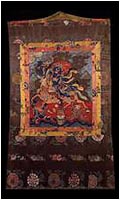
|
Mahakali (painting no. 472)
|

View Larger Image |
|||||||||||||
|
This applique image is further embellished with seed pearls. MM 'Queen of the Weapon Army' (Magzor Gyalmo), with one face and two hands, holding aloft a stick in the right hand and a skullcup in the left. She rides a donkey; standing in the middle of an ocean of blood. At the bottom are two attendants. To the left is the 'Makara Faced One,' (makara: a sea creature) blue in colour with one face and two hands; holding a lasso and always placed to the front of the central figure holding the reins of the donkey. To the right is the 'Lion Faced One,' dark red, holding a curved knife and skullcup. This attendant follows behind the mount. Both are adorned with human skins and bone ornaments. This subject, often commonly ascribed as Shri Devi (who has four hands), is the main attendant to Shri Devi and they are two different deities with different histories and personalities. 'The Queen of the Weapon Army' is the wrathful aspect of the very peaceful goddess Sarasvati (Tibetan: Yang Chenma). She is always a protector and is also used for divination rituals. Most Tibetan Schools have some form of this deity. It is commonly found on Sakya and Gelugpa paintings. This practice was adopted early on as the special protector for the Dalai Lamas and the Namgyal College of the Tse Potala Palace. (Inscription: To the Glorious Goddess I bow.) Jeff Watt 4-98 Palden Lhamo, or Shri Devi, is both a protective deity and a tutelary deity. Here she is seen riding the yellow horse of prosperity. She is dressed in human skins, and carries a mace and a skull full of blood. As she rides she tramples out the demonic obstructions, and all the hopes and fears of worldly existence are washed away in a sea of blood. She represents that power of feminine wrath to cut through or decimate the many ego-based contrivances of this world, and to smooth the path to enlightenment thereby. CW 1-98
|
||||||||||||||
Photographed Image Copyright © 1999 Shelley & Donald Rubin Foundation
|
|
| |
Next Image |